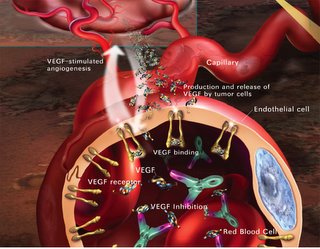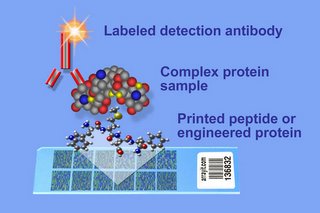Genes and knowledge
There's an article in the February 13th issue of Forbes about the Gene game. It's titled "The Giant Genome Fizzle". It's quite interesting and lots of that is due to this being my job area.
 While I've often worked in less technical areas of bio research, right now I'm at the medical forefront by analysing genes for ties to angiogenesis and breast cancer. It's very interesting work--more so lately because we've had some very intriguing results on the angiogenesis side.
While I've often worked in less technical areas of bio research, right now I'm at the medical forefront by analysing genes for ties to angiogenesis and breast cancer. It's very interesting work--more so lately because we've had some very intriguing results on the angiogenesis side.
The Forbes article, however, is about how the field of Genomics has let us down. Their lead example is the hoopla that followed the discovery of MTP (Microsomal Transfer Protein) and it's vaunted link to longevity. A team of researchers at Harvard Medical School had determined in 2002 that this gene was linked to the incredible longevity that some people exhibit. Not surprisingly this finding was heralded in many magazines, news shows, and even Good Morning America. What wasn't touted was the data published in 2005 that there's no link between MTP and longevity. Ooops.
The article also goes on to discuss ACE (Angiotensin Converting Enzyme) and heart attacks, Xq28 Locus and male homosexuality, and BRCAI/BRCA2 and breast cancer. All these genetic factors have been considered strong determiners and have since been called into question. Of the 4, only BRCA2 is holding up though even with that gene there's some controversy.
The root behind these problems is the use of DNA Microarrays. While these are incredible tools for gene discovery--I use them all the time--they also make finding supposed links between diseases and genes too easy. Even detailed statistical analysis of the microarray data can allow red herrings to come through, particularly if you're using a homogenous population in your study. That's because certain genes might be rare in the general population but common in subpopulations.
 If you find a lot of pancreatic cancer in a certain group of people, and they all have a certain gene, call it AA, you might quickly conclude that gene AA is causing pancreatic cancer. However it's possible that in this population gene AA is common and that everyone has it, pancreatic cancer or not. Since a researcher would typically just get samples of tumor, we often have no normal controls from the same population of people that the tumor came from.
If you find a lot of pancreatic cancer in a certain group of people, and they all have a certain gene, call it AA, you might quickly conclude that gene AA is causing pancreatic cancer. However it's possible that in this population gene AA is common and that everyone has it, pancreatic cancer or not. Since a researcher would typically just get samples of tumor, we often have no normal controls from the same population of people that the tumor came from.
Generally speaking, that doesn't happen a lot since populations move about so much there's not typically gene isolation of this kind. But in disease studies isolated populations are used frequently since they're easier to analyze and also diseases modalities occur more often therein. And it's just that isolation that can lead to false conclusions based on genetic data.
The Forbes article is right on target but it's not likely to change anything. Given the technology we have now, using microarrays to datamine genetic factors is the best game in town for trying to determine why we get the diseases that we do--and also other factors like aging or sexual preference.
 While I've often worked in less technical areas of bio research, right now I'm at the medical forefront by analysing genes for ties to angiogenesis and breast cancer. It's very interesting work--more so lately because we've had some very intriguing results on the angiogenesis side.
While I've often worked in less technical areas of bio research, right now I'm at the medical forefront by analysing genes for ties to angiogenesis and breast cancer. It's very interesting work--more so lately because we've had some very intriguing results on the angiogenesis side.The Forbes article, however, is about how the field of Genomics has let us down. Their lead example is the hoopla that followed the discovery of MTP (Microsomal Transfer Protein) and it's vaunted link to longevity. A team of researchers at Harvard Medical School had determined in 2002 that this gene was linked to the incredible longevity that some people exhibit. Not surprisingly this finding was heralded in many magazines, news shows, and even Good Morning America. What wasn't touted was the data published in 2005 that there's no link between MTP and longevity. Ooops.
The article also goes on to discuss ACE (Angiotensin Converting Enzyme) and heart attacks, Xq28 Locus and male homosexuality, and BRCAI/BRCA2 and breast cancer. All these genetic factors have been considered strong determiners and have since been called into question. Of the 4, only BRCA2 is holding up though even with that gene there's some controversy.
The root behind these problems is the use of DNA Microarrays. While these are incredible tools for gene discovery--I use them all the time--they also make finding supposed links between diseases and genes too easy. Even detailed statistical analysis of the microarray data can allow red herrings to come through, particularly if you're using a homogenous population in your study. That's because certain genes might be rare in the general population but common in subpopulations.
 If you find a lot of pancreatic cancer in a certain group of people, and they all have a certain gene, call it AA, you might quickly conclude that gene AA is causing pancreatic cancer. However it's possible that in this population gene AA is common and that everyone has it, pancreatic cancer or not. Since a researcher would typically just get samples of tumor, we often have no normal controls from the same population of people that the tumor came from.
If you find a lot of pancreatic cancer in a certain group of people, and they all have a certain gene, call it AA, you might quickly conclude that gene AA is causing pancreatic cancer. However it's possible that in this population gene AA is common and that everyone has it, pancreatic cancer or not. Since a researcher would typically just get samples of tumor, we often have no normal controls from the same population of people that the tumor came from.Generally speaking, that doesn't happen a lot since populations move about so much there's not typically gene isolation of this kind. But in disease studies isolated populations are used frequently since they're easier to analyze and also diseases modalities occur more often therein. And it's just that isolation that can lead to false conclusions based on genetic data.
The Forbes article is right on target but it's not likely to change anything. Given the technology we have now, using microarrays to datamine genetic factors is the best game in town for trying to determine why we get the diseases that we do--and also other factors like aging or sexual preference.

Comments
Michele sent me here.
Came by way of Michele this time, but often visit on my own iniative.
I think the research you do is very admirable.
(Like your new design, too.)
Anyhow, I'd love to hear more about your work. My friend with BC just was genetically tested (positive) so her daughter needs to be tested. It so sucks.
Here via Michele today.
Btw, Michele sent me.
While this is not my area of expertise, it is exactly what a couple of my friends like to talk about. I think I'll send them your way.
P.S. I could never do that for a whole wedding, more like a bridesmaid's luncheon or a dinner for a guy to propose.
Just happen to be sent here by Michele tonight!
This definitely gives us hope for a better future.
Ma BLog Is Laughingmachine.blogspot.com
I Hopes You Will Link To Me
By Kaileena
LaughingMachine@gmail.com